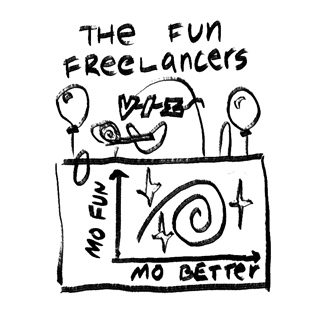My first year as a data visualization freelancer
January 07, 2018
At the end of last year, I quit my job. I stopped working as a data journalist at a Belgian newspaper to become a data visualization freelancer. It was a leap into the unknown, so one year in I think is a good time for a look back.

Illustration by Susie Lu, source
The work
One thing I like about freelancing is the diversity. Diversity in people you meet, in companies you get to know, in the data they have, what they do with it and what they wanted me to do with it. If data isn’t everywhere, it sure is in a lot of places.
There is also a lot of diversity in my output. A downside of doing freelance visualization work, especially compared to working in the media, is that a lot of your work has to stay behind closed doors. But these are some of the things I did in the past year:
- recorded my first video courses ever
- given lots of workshops and talks
- designed customized dashboards for health statistics in developing countries
- made an interactive map for a gps-enabled art project
- made interactive charts on golf statistics and model predictions
- worked with Google News Lab on the Eurovision Song Contest
- did R&D for a visualization tool in development
- designed the interface for a big data reporting tool
- compiled a study on interactive choropleth maps for a map making tool
- wireframed the UX of a data portal and its visualizations
- produced charts and maps for a report of a EU-related organisation
I did a lot less data journalism then I was planning to do, but a look of what is in the pipeline tells me this will be different in 2018. I also hope to get some hobby projects out of the door this year.
Learning
A consequence of all the different things I did, was that I learned a lot of new stuff. I learned many new tools (Adobe XD, Bitbucket/Sourcetree, Vega, Typescript, gulp) and deepened my knowledge of tools I was already using (git, a lot of ggplot/R, D3, Mapbox GL). I also switched to Visual Studio Code for code editing.
I was lucky to be asked to take a deep dive into some specific topics, many of them map related. That’s how I learned a ton about choropleth maps, origin-destination maps and hexagon grid maps.
I also learned a lot by answering questions like ‘What exactly is the anatomy of a bar chart?’ :-)
In my first year as a freelancer I obviously also learned a thing or two about planning my work, how to approach and deal with clients (I have to admit that one smaller assignment didn’t end well) and how to run my administration. I also learned that there are ever so many different platforms for doing conference calls :-)
Work-life
I don’t want to sound like yet another ‘I-quit-my-job-and-everything-is-better-now’ freelancer, but yes, being able to organize work around the other parts of my life is a big plus. Quittng early and continuing at night, or swapping a Sunday with a Monday: that is nice if you need some flexibility. I’m definitely spending more time with my kids than I was before.
I spend around half of my days working from home. I do miss the occasional discussions and good laughs with the colleagues, but you get other things in return (a lot less commuting, for example). But: good headphones are a must in my house :-).
What is also very different from my life as an employee are the fluctuations in work load. Sometimes you have 3 deadlines in a week and suddenly 2 new clients want to meet in that seem week. And sometimes your agenda is almost blank (especially in summer and other holiday periods).
One downside of freelancing: the feeling of guilt when you take days off and spend money on vacation and other things. There is always that little voice, whispering in your ear: ‘No billable hours today. You are not making any money today. You are only spending money today.’ I guess a little more experience will wear off that guilty feeling…
On the upside: my job brought me to Holland (Rotterdam, Eindhoven, Utrecht), Turin, and New York (allthough my work there was cancelled). I also travelled to attend conferences in Boston and Pamplona.
The €€€
Before I started, I did a little modelling of my income, expenses and taxes, so I could compare what I had with what I expected from working as a freelancer. It looks like my revenue lies in the upper ranges of my estimations, so that’s good.
But the downside of being self employed is that income, expenses and taxes are spread out over a long time period and knowing what you actually made comes long after actually doing the work. I’m awaiting the calculations of my accountant, so no definitive conclusions from that front for now :-)
Conclusion
All in all: Lynn Cherny gives excellent advice to Data Vis Consulting Newbies. I have experienced most of what she described in her classic blog post.